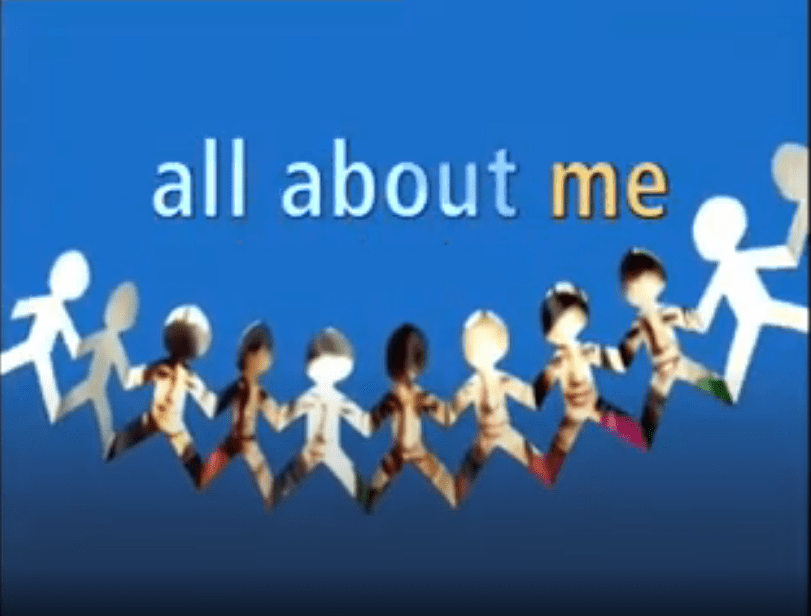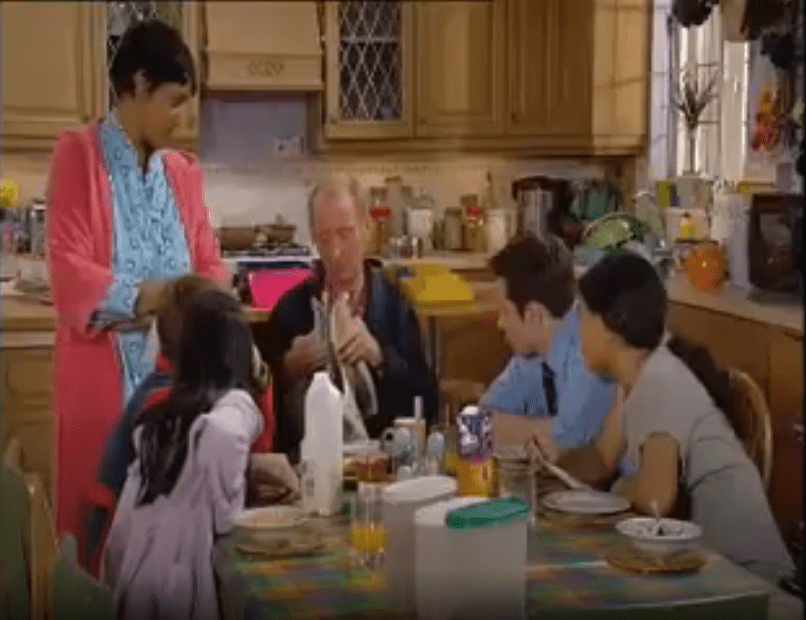
Introduction
On the 29th of March 2002, BBC One implemented its Rhythm and Movement idents. Designed to replace the old balloon ones, they were notable for its use of people and diversity – one involved three basketball players dancing in their wheelchairs, another involved two performers performing the Brazilian martial art of the Capoeira, and another involved the performance of the traditional Maori Haka. I bring this up because All About Me, first broadcast on the 8th of March 2002, feels like these idents in sitcom form – a grand attempt at showing off the lives of people in the UK in a quite diverse manner. Was it successful, however? Let us find out.
Background
The earliest I can find of All About Me comes from a 2001 article from The Guardian, which noted that Lorraine Heggessy, the BBC1 controller at the time, felt that it would be “one of the bravest comedies to appear on British TV for years”. Humorously, it was written by Steve Knight, who on top of being the creator of Who Wants To Be a Millionaire? would go on to create the BBC hit Peaky Blinders.
The show was notable for bringing in an actual disabled child in the show – Raj was played by Jamil Dhillon, and he had cerebral palsy as well. The actor has gone on to state that he was more interested in web design as a career and his IMDb page reflects that with All About Me being the only credit there.
The others do have a bit more to their pages – the sitcom is headlined by Jasper Carrott, who has a lengthy career in stand-up comedy and did the show The Detectives. Also part of the cast is Meera Syal, who at the time was notable for her roles in Goodness Gracious Me, an earlier comedy which like this one also had a look at British-Asian life. Whilst the other children actors haven’t done much – Robert Cartin’s only other TV role was in Doctors, Natalia Cappuncini did some roles before going into music, eventually taking on the name of Teddy Sinclair, and Alina Iqbal only did a couple of shorts around the time of All About Me – Ryan Cartwright ended up with a recurring role in Hardware and managed to get regular work in America.
I suspect that this sitcom was made in an attempt to capture the success of My Family, which was at the time a big hit with audiences. The fact that it has a similar Americanized style and they both went out at the same time slot at 8:30 on a Friday probably helps fuel this suspicion.
My Family was derided by critics however for being too safe and predictable, and this would be a fate that would befall this sitcom as well – The Guardian called it “unfunny and out-of-date”, arguing that the plots were pedestrian, that Colin was flimsy as a character, and that it had only two kinds of jokes – those which were corny and those which were lame. Meanwhile, the Evening Standard took the opportunity to mock the show in their TV listings, calling it dismal. The Independent went the same route, calling it “for Jasper Carrott fans only”.
Still, it didn’t stop the show from getting a respectable run – 3 series isn’t particularly bad. Interestingly, Ash Atalla, who was a producer for The Office, was brought in to do revamps for Series 2. There was an acknowledgment that Raj got the short end of the stick (and for reasons I’ll say later, I do agree with this) and he altered the character by giving him a voicebox. Another revamp included Meera Syal (why is unclear) leaving and being replaced by Nina Wadia, another star from Goodness Gracious Me. Series 3 also didn’t have Ryan Cartwright in it (again, can’t find why – too busy on Hardware maybe?).
Ultimately, however, the show wasn’t renewed for Series 4, and it was sent hurtling into the depths of history. What probably doesn’t help it, in this case, is the fact that it currently doesn’t have any DVD releases or the fact that it doesn’t seem to have been repeated afterward. Indeed, until I by chance managed to discover the majority of them, only one episode was up online. Nowadays, if it is brought up, it isn’t with particular fondness.
Premise

The show is focused on a multicultural blended family, involving two divorcees and their children coming together and living under one roof. Colin (Jasper Carrott) is the father and is perhaps best described as a discount Alf Garnett – he’s very working-class, has some bigoted views, and is somewhat dis accepting of his children. He isn’t as bad as Alf though, seeing as he married a colored woman with a disabled child, and the show usually portrays him as more akin to your typical “bumbling dad”, sometimes prone to mistakes, but ultimately loving his family.
Rupinder (Meera Syal in Series 1, Nina Wadia in Series 2 and 3) is your typical mother character, being driven insane by the demands of her family and tutting at the occasional mad schemes of her husband, although she does love him. She works at a florist shop in Series 1, although come Series 3 and she’s running an online business.
As for the children, Sima (Natalia Cappuccini) is the 16-year-old half-sister of Rupinder. She is interested in dating young men, to the point that Peter speculates that it’s because she’s anxious about her appearance. She even almost falls pregnant in one episode, although that seems to be a false alarm. By Series 3, she is exploring the world of temp work and sometimes gets into trouble for it.
Peter (Ryan Cartwright) is the oldest of the children. He starts the series wanting to become an architect but is scared of telling his father. This is a bit anti-climactic in the end – he manages to tell Colin in Episode 2, but we don’t see too much reaction from Colin, although it is implied that he is accepting of his son in this respect. From then on, he fulfills a similar role of pining after a particular girl, although we do get some nice scenes between him and Sima.

Raj (Jamil Dhillon in-person and in voiceover for Series 1, Luke Allder in voiceover in Series 2 and 3) is perhaps the most interesting of the lot – he starts the series heavily disabled, being unable to walk or talk because of his cerebral palsy. Why he doesn’t use a letter board isn’t revealed until “Little Voice”, where we find that he finds it frustrating (not helped by the fact that people keep second-guessing him), although Episode 3 does have he laboriously compose a letter for Leo. He doesn’t shine until Series 2, where he finally gets a voice box. Although his voiceover already shows him to be the snarky type, it is more pronounced after the voicebox, and he clearly has a more bratty side such as stealing VHSes alongside Leo and bullying his friend.
Then, there is Leo (Robert Cartin). Leo starts out being obsessed with maths but is friendless and doesn’t have traditional male interests, to the point that he’s thought of to have Autism. They drop this aspect in Series 2 however, and he’s just your regular young teen, although he does get some spotlight such as when he considers going to Spain with his mother in the first episode of Series 3.
Finally, there is Kavita (Alina Iqbal) – Kavita doesn’t do very much, but she does serve the role of the cute kid.
As the show goes on, we see some changes. Firstly, after a lengthy labor involving a weird pre-birth conversation with the baby, the end of Series 1 saw Jay Craddock born into the world. Secondly, Series 2 has a minor plotline featuring Raj getting a voice box, giving him more involved in the plot in the process. Series 3 gives the most changes – Colin has changed jobs and has started working at an architectural salvage business, Peter has departed for a gap year, and they’ve gotten new neighbors – Charles and Miranda are essentially a broad collection of Liberal stereotypes, obsessed with recycling, vegetarians (unless it’s roadkill), and usually attempting to be as tactful as possible when it comes to alternative cultures (and usually failing). Clearly, these two are meant to be in opposition to the more right-wing views of Colin and this is seen through the family’s agitation towards them, to the point that they even send Raj to them as part of an unusual punishment in “Little Voice”.

Opinion
The show was actually at its best in Series 1. It had its flaws – Raj is at his weakest here, serving not much more than the role of someone who the others can talk to and fret about with little agency himself – but it was there that the show both tried to distinguish its individual characters best and tackle more serious topics better. Series 1 gives us an exploration of topics such as the difficulties of raising a severely disabled child (Colin and Rupinder fear that their new child will be like Raj, Rupinder’s previous husband walked out on her because he couldn’t accept his son’s condition, and one episode had Raj admit that he sometimes wished he could do an activity which genuinely exhausted him), the occasional financial issues (one episode had Colin admit on a crappy holiday that he isn’t really enjoying it either, but it was all they could afford), the troubles that can come from a mixed marriage (in the episode mentioned just previously, Colin overhears two men insulting the marriage and gives them their comeuppance by switching his odd-tasting beer with them). They even briefly explore the topic of Asperger’s when the cast speculate that maths-obsessed and friendless Leo has it. Being Autistic myself, I did feel for Colin when he feared for his son’s happiness and it was sweet him telling Leo to do whatever makes him happy, even if the portrayal of it was slightly stereotypical.

I did have some difficulties believing Colin as a character – he’s apparently meant to be this moaning, bigoted character, but they also pair him up with an Asian person and have them get along fine. It may well explain why they tilted more on the bumbling dad angle as the show went on.
Series 2 and 3 however feel way too much like a pedestrian sitcom to me, more interested in generic stuff like romantic relationships and all than anything too deep. Granted, they do occasionally explore the topics established last series, but definitely not to the same extent. Not helping matters is that they do drop some characteristics which helped to distinguish the characters more – one thing that I was looking forward to was the possible conflicts between Peter and his father on differing views, which had already been teased through his interest in becoming an architect. The conclusion to that came too quickly and anti-climatically and they don’t do much to distinguish him from the other teenage cast. A similar problem befalls Leo, who seems to have inexplicably dropped his interest in numbers. I did like how they gave Raj a voicebox however and allowed his more bratty side to show up, making him one of the better characters in my opinion.
Series 3 is slightly better. Oddly enough, Peter’s departure is barely felt, although the large cast probably helped in this regard. Charles and Miranda however feel a bit too “broad archetype”, not helped by the last episode suggesting that they don’t really have much depth to them at all (granted, Miranda apparently had a strict upbringing, but it’s unclear if this is why she enjoys recycling so much). I also get the feeling that the possible conflicts relating to their political views weren’t utilized clearly enough – it probably didn’t help that, with the exception of Leo who actually crushed on Miranda in an episode, the family just disliked them in general.
A final point, but the show did feel at times to be overly sentimental – not just stuff like Raj wanting to play football, but moments like when Leo is asked by his mother to go to Spain with him, but refuses because his family is back home in Birmingham with him.
Best Episode
Probably “Little Voice” – I did laugh at Raj’s punishment being to spend time with Charles and Miranda and Raj’s frustrations with the loss of his voice box were both funny and relatable. Plus, I loved him being a bit of a jerk, bullying his friend and trying to flee when caught.
Conclusion
It’s nothing remarkable, but it’s not particularly offensive either (although I can’t be too sure about the portrayal of the Pakistani due to lack of knowledge). Still, you can watch it on Youtube now.
